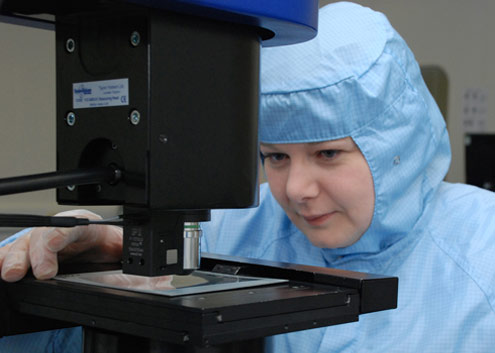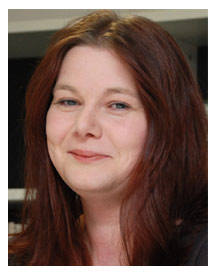Solar solution
Mon, 12 Mar 2012 11:43:00 GMT

Dr Leigh Fleming begins lab work on the multi-million Euro NANOCleaR research project
SUPER thin, flexible and easily affordable solar panels are poised to make a massive contribution to energy needs. They can simply be rolled out on to a roof – or even attached to a hybrid vehicle to provide top-up power.
But if their full potential is to be realised, they must be more efficient and have a longer lifespan. Scientists at the University of Huddersfield are playing a key role in making sure this happens.
They are co-ordinating a four-million Euro project, funded by the EU, and scheduled to last four years. The University of Huddersfield’s Centre for Precision Technologies (CPT) – a world leader in the science of measurement – is responsible for a crucial phase of research.
The head of the CPT, Professor Liam Blunt (pictured), explained that thin and flexible photovoltaic (PV) sheets had enormous advantages, especially when compared to the solid solar panels that are currently the norm.
“They are much lighter and can be incorporated into buildings right from the build stage. And they don’t have to be bolted on as big silicon/glass sheets later on.”
But there is a problem. When thin film products such as the PV sheets are manufactured, microscopic holes appear in the coating. When the sheeting is installed, water can seep into these holes, reducing the performance and the life of the product.
If the holes can be detected and repaired and greater knowledge gained of how and why they appear in the first place, then the lifespan of PV sheets could be stretched to 25 years, rather than possibly failing after ten, said Professor Blunt.
He and his team at the CPT will approach the problem by developing sensors which will be attached to the machines that produce the PV sheeting. A firm in Switzerland that is a major manufacturer of the products is one of the 14 industrial and academic partners in the project, which is named NANOCleaR.
The CPT is a pioneer in the development of sensors designed to produce massive gains in accuracy during manufacturing processes, and will draw on this expertise for the NANOCleaR project.
Other partners will be investigating a parallel problem in the manufacture of polymer-coated papers – of the sort used in drinks cartons, for example. These too develop nano-scale defects during production.
The NANOCleaR project has been launched at a special event held at the University of Huddersfield, and is managed by Kite Innovation Europe Ltd, which is based in Huddersfield’s hi-tech Media Centre. The company was formed six years ago to bridge the gap between the academic and business sectors and it has expertise in the European Framework 7 Programme, which yielded the funding for NANOCleaR.
Beyond the surface
 A KEY role in the NANOCleaR project will be played by Dr Leigh Fleming (pictured), a a Senior Research Fellow in the EPSRC Centre for Innovative Manufacturing in Advanced Metrology in the School of Computing and Engineering. Her main research interests lie in the application and development of surface metrology to characterisation of functional surfaces.
A KEY role in the NANOCleaR project will be played by Dr Leigh Fleming (pictured), a a Senior Research Fellow in the EPSRC Centre for Innovative Manufacturing in Advanced Metrology in the School of Computing and Engineering. Her main research interests lie in the application and development of surface metrology to characterisation of functional surfaces.
Dr Fleming has worked with the group under Professor Liam Blunt since 2005 and has been involved in a variety of projects from characterisation of semiconductor surfaces and manufacturing optimisation for aerospace components to wear assessment of orthopaedic implants
She will be involved in the primary phase of NANOCleaR using her extensive knowledge of surface metrology techniques to collect information about the specific surfaces and potential defects in order to facilitate future developments in the later phases of the project.







